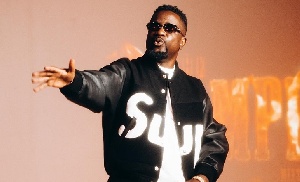- Home - Entertainment
- Lifestyle News
- Year In Review
- Music News
- Entertainers
- Entertainment Archive
- Entertainment Photos
- Jokes
- Entertainment Headlines
- Ameyaw Debrah
- Brown GH
- Celebrities Buzz
- GH Base
- Ghana Celebrities
- Gh Gossip
- GH Page
- GH Splash
- Hot Gossip GH
- YEN
Entertainment of Tuesday, 8 April 2025
Source: www.ghanawebbers.com
How African rappers are flipping the script on global Hip-Hop
For decades, hip-hop has been linked to New York and the Bronx. It also reflects the storytelling of Compton.
Now, a new wave of rappers is emerging from Africa. They come from cities like Accra, Lagos, Johannesburg, and Nairobi. These artists are changing the rap scene globally.
African rappers are proving that rap is not just an American genre. It has deep roots in Africa and is a global movement.
From the Motherland to the Mainstream
African rap has its own unique style. It blends indigenous languages and rhythms with hip-hop energy. Today, these artists are gaining international recognition alongside Western rappers.
Stars like Sarkodie (Ghana), Nasty C (South Africa), Khaligraph Jones (Kenya), M.anifest (Ghana), Falz (Nigeria), and Cassper Nyovest (South Africa) are leading this change. They show that rap can embrace African culture while appealing to a global audience.
Sarkodie is one of Africa’s most celebrated rappers. His sharp Twi-infused lyrics showcase his talent and drive. He has opened doors for other artists, proving African rap can thrive without losing its essence.
Nasty C is making strides in the U.S., signing with major labels and collaborating with stars like T.I. and Snoop Dogg.
A Sound That Breaks Barriers
African rap thrives on diversity across the continent. The hip-hop scene draws influences from Afrobeats, dancehall, highlife, kwaito, and traditional storytelling.
In Nigeria, Falz mixes humor with social issues in his music. In Kenya, Khaligraph Jones offers a gritty style that resonates deeply with listeners.
Language barriers do not hinder this movement either. Rappers use Swahili, Hausa, Zulu, Twi, Yoruba, and Pidgin English instead of only English lyrics.
Global audiences appreciate these authentic sounds as they have embraced reggaeton and K-pop without losing their cultural identity.
Global Co-signs and Collaborations
The rise of African rap includes many global collaborations now happening. Artists partner with musicians from America, Europe, and Asia to expand their influence.
Burna Boy combines rap with Afrobeats for Grammy wins and collaborations with Stormzy and J. Cole. Black Sherif's storytelling has attracted international attention through features with Popcaan.
Major record labels like Def Jam Africa and Universal Music Group are investing in African talent now more than ever.
A Movement Rooted in Identity
African rap represents identity, empowerment, and social change beyond just music. Unlike some Western rap that focuses on materialism, African artists address political issues directly.
Songs like Falz’s “This is Nigeria” echo Childish Gambino’s “This is America.” Sarkodie’s “Brown Paper Bag” critiques neocolonialism as well—showing that African rap speaks for its people.
The Future Is African
As African rap gains popularity worldwide, it reshapes the genre's future beyond Western confines. Artists redefine global hip-hop narratives by showcasing their stories too.
With sold-out tours and streaming success worldwide, attention on African rap grows stronger every day. This unstoppable movement marks a significant chapter in music history.











